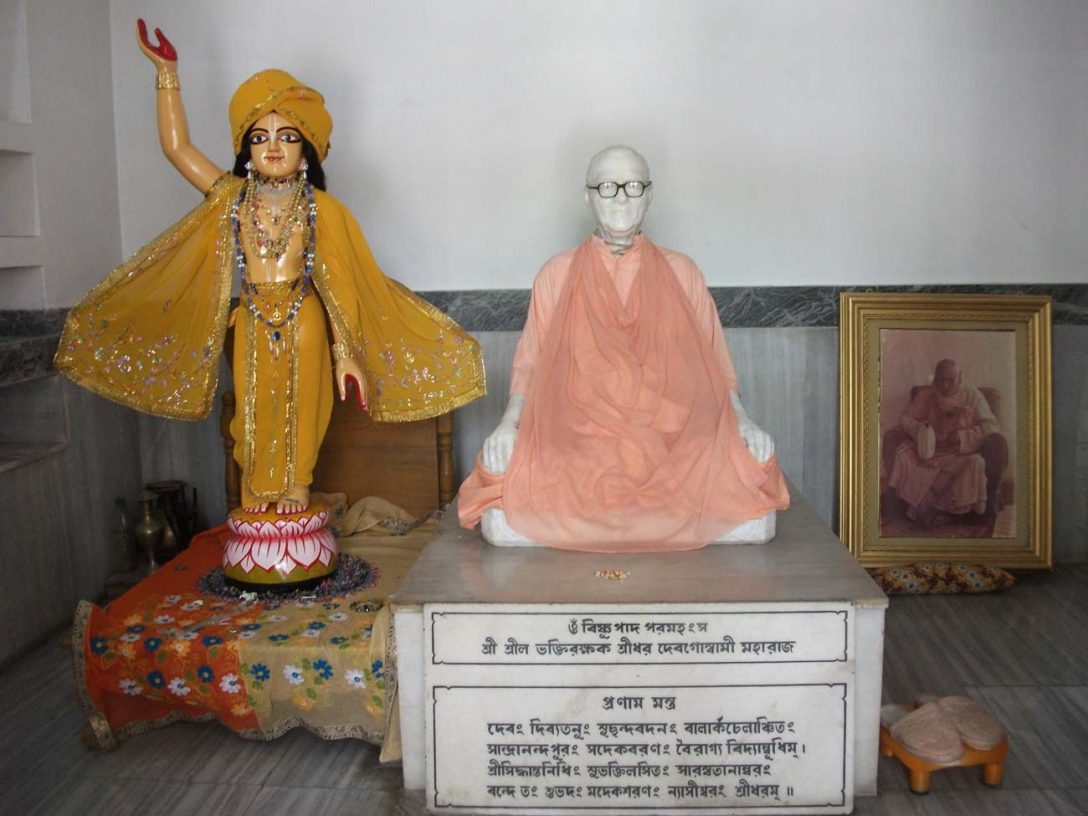The process is always dynamic. Everything is dynamic in character, progressive. It is līlā and nava-navāyamān [ever-new]. The conception of the Infinite is not a stagnant one but a dynamic one. The infinite is dynamic. But to have such a conception of Infinite, of course, is very difficult.
The Infinite is infinite, not static but dynamic. He is līlāmaya. Līlā means nava-navāyamān, ever-new. This a characteristic of the Infinite, and we are to take direction from this. It is not, however, that the Infinite is in want and is dynamic to have fulfilment. It is not that. It is the nature of the Infinite to be dynamic. This is called līlā. The very nature of the Infinite’s existence within eternity is līlā. The Infinite is always satisfying Himself, and that movement is always a pleasing and moving thing. The pleasure, the ecstasy, itself is of moving character. This is līlā. In it, there is no want to be fulfilled.
kahibāra yogya naya tathāpi bāule kaya
kahile vā kebā pātiyāya
(Śrī Chaitanya-charitāmṛta: Madhya-līlā, 2.49)
“This should not be discussed. Still, one cannot but talk about it like a madman. But if one goes on talking and talking in this way, who will believe what is said? No one will waste their time listening to this madman’s delusion.”
āmi—eka bātula, tumi—dvitīya bātula
ataeva tomāya āmāya ha-i sama-tula
(Śrī Chaitanya-charitāmṛta: Madhya-līlā, 8.290)
“I am a madman, and you are also a madman of the same type. So, you have come to listen to these delirious statements. We are of the same section. I am mad, and you are also mad. So, we feel enjoyment in such mad talk.”
This is Rāmānanda Rāy and Mahāprabhu.
yā niśā sarva-bhūtānāṁ tasyāṁ jāgarti saṁyamī
yasyāṁ jāgrati bhūtāni sā niśā paśyato muneḥ
(Śrīmad Bhagavad-gītā: 2.69)
[“Those who have full self-control are awake in that which is night for all beings, and all beings are awake in that which is night for the sages who see.”]
gaura-nāgaro-varo nṛtyan nijair nāmabhiḥ
(Śrī Chaitanya-chandrāmṛta: 132)
Mahāprabhu Gaurāṅgasundar is dancing, taking His own Name and dancing. He utters different sounds, receives some impressions from them, and dances. Getting impressions from the sound of His own Name, He dances. The cause is the effect. In logic perhaps, I have heard the term petitio principii. The movement is circular, like the Napoleonic chair.
Nṛtyan nijair Nāmabhiḥ: His own Name is the cause of His dancing. The suggestions from different Names are coming to Him, those impressions are creating some energy, and that energy is making Him dance. He is a dynamo creating ecstatic energy, and that is the cause of His dancing. Taking His own Name, He is dancing. This is His līlā. Such is Gaurāṅga and His moving ecstasy.
In my Prema-dhāma-stotram, I wrote that He is the ultimate reality, the Absolute. Why? Two things are represented in Him. One, He dances in ecstatic joy as a result of a feeling within, and two, by chanting, He distributes that to others. He finds Himself in ecstasy and distributes that to others. This is Gaura, and the highest principle of ecstatic energy is such. It cannot but be such. He is of a dancing mood; He is fulfilled in Himself. His dancing explains that His inner propensity is that of ecstatic joy, and kīrtan means distribution of that to the public, to the environment. It is assertive. The ecstatic joy is assertive, self-assertive and self-distributed. This we find only in Gaurāṅga. So, Gaurāṅga is the highest entity. In that way, I have dealt with it there. In ecstatic joy, He is dancing, and through kīrtan, He is distributing Himself to others (ātma-vaṇṭanam). He is offering, distributing, Himself to the environment. This is His līlā.
ānanda-līlāmaya-vigrahāya
hemābha-divya-chchhavi-sundarāya
tasmai mahāprema-rasa-pradāya
chaitanyachandrāya namo namaste
(Śrī Chaitanya-chandrāmṛta: 11)
This dhyān [meditation] is from Śrī Prabodhānanda Saraswatī, the Guru of Gopāl Bhaṭṭa Goswāmī. It is a beautiful stanza coming in praise of Śrī Chaitanyadev.
Ānanda-līlā-rasa-vigrahāya: immersed in ecstatic Pastimes, He is rasa personified. Hemābha-divya-chchhavi-sundarāya: He is golden beauty, ecstatic beauty, emitting golden lustre, a most beautiful, divine figure. Mahāprema-rasa-pradāya: He distributes the highest divine love with His movements, His words, and His every gesture and posture. Chaitanyachandrāya namo namaste: I bow my head down to this Śrī Chaitanyadev.
In Archana-kaṇa, this has been taken up for our dhyān. When we meditate on Mahāprabhu, we should do so in this way.
Source
Spoken 21 February 1982
References
ko ’yaṁ paṭṭa-dhaṭī-virājita-kaṭī-deśaḥ kare kaṅkaṇaṁ
hāraṁ vakṣasi kuṇḍalaṁ śravaṇayor bibhrat pade nūpurau
ūrdhvīkṛtya nibaddha-kuntala-bhara-protphulla-mallī-sragā–
pīḍaḥ krīḍati gaura-nāgara-varo nṛtyan nijair nāmabhiḥ
(Śrī Chaitanya-chandrāmṛta: 132)
“Wearing a silk sash around His waist, bracelets on His wrists, a necklace across His chest, earrings on His ears, bells on His ankles, and a garland-crown of blooming jasmine flowers atop His top-not of wavy hair—who is that golden king of revellers who frolics, dancing to the chanting of His own Names?”
ātma-siddha-sāvalīla-pūrṇa-saukhya-lakṣaṇaṁ
svānubhāva-matta-nṛtya-kīrttanātma-vaṇṭanam
advayaika-lakṣya-pūrṇa-tattva-tat-parātparaṁ
prema-dhāma-devam eva naumi gaura-sundaram
(Śrī Śrī Prema-dhāma-deva-stotram: 66)
“I offer my obeisance to the abode of divine love, Śrī Gaurasundar, the embodiment of complete, self-manifest, dynamic ecstasy. Maddened by experience of Himself, He dances, chants, and distributes Himself. Replete with this unparalleled characteristic, He is the Supreme Absolute Truth.”
ānanda-līlāmaya-vigrahāya
hemābha-divya-chchhavi-sundarāya
tasmai mahāprema-rasa-pradāya
chaitanyachandrāya namo namaste
(Śrī Chaitanya-chandrāmṛta: 11)
“To the embodiment of ecstatic Pastimes, to the divine, splendorous golden personification of beauty, to the giver of the nectar of the highest divine love, to the moon Śrī Chaitanya, I bow again and again.”
Originally published on premadharma.org as ‘The Highest Entity‘

